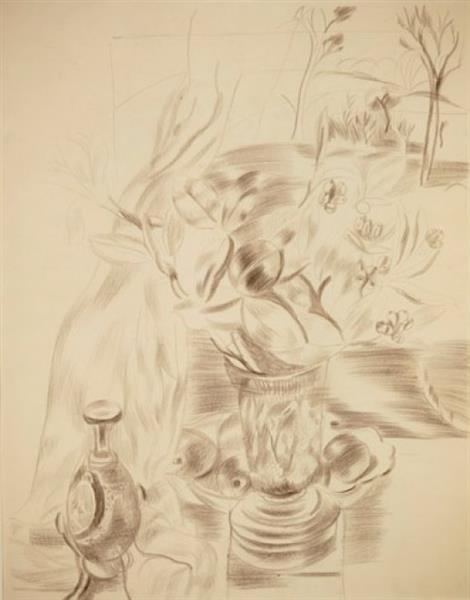Description
Frances Hodgkins, one of the most outstanding figures of modernism in New Zealand, bequeathed in 1932 an artistic jewel that mastery both tradition and innovation. His work "Drawing with landscape" is presented as an emblematic example of his ability to merge the figurative with the abstract, filtering the influences of European artistic movements of the early twentieth century through his unique vision.
When observing "landscape drawing" you can immediately see the sensitivity of Hodgkins towards color and shape. The painting, which is characterized by a warm and earthly pallette, highlights the artist's ability to experiment with tones ranging from ocher to deep browns, creating an almost dreamlike atmosphere. The tones combine harmoniously and make the work transmit a particular serenity, evoking an emotional connection with the viewer.
The composition of the work is structured in a landscape that does not seek to imitate nature but interpret it, which is characteristic of the modernist approach of Hodgkins. The elements of the landscape are presented simplified, almost abstract, with geometric shapes that suggest more than define. This approach encourages viewers to apply their own interpretation of the elements and structures present in the work, thus breaking the traditional notion of landscape representation.
One of the most notable characteristics of "landscape drawing" is the absence of human figures. This could be interpreted as an invitation to focus purely on the interaction between the natural elements and the abstract forms that Hodgkins has chosen to represent. This displacement of the human allows greater meditation on the relationship between the human and his environment, an issue that underlies many of the artist's works.
Hodgkins worked in an era of intense artistic and social changes, and his work reflects an amalgam of influences ranging from Fauvism and Cubism to the Paris school. However, he always leaked these influences through his unique sensitivity, which is evident in "landscape drawing." The artist uses a visual language that challenges strict categories and seeks a personal expression that transcends the specific artistic movements of her time.
Another work that could offer an additional context to the analysis is "The Pleasure Garden" (1928-30), where Hodgkins also explores the landscape, but with a more lush and detailed approach. When comparing both paintings, One can notice the evolution of its style and the way in which its use of color and the way to evoke emotions and specific atmospheres refines.
In conclusion, "Drawing with landscape" by Frances Hodgkins is a brilliant sample of the artist's ability to interrogate and reinterpret their surroundings through a modernist lens. With its skilled color use, the abstraction of forms and the conscious absence of human figures, Hodgkins offers us much more than a landscape: it provides us with a space for contemplation and introspection about our relationship with the natural world. This painting Not only does it represent a milestone in the artist's career, but also reinforces her position as one of the most innovative and resonant voices of modernist art of the twentieth century.
KUADROS ©, a famous paint on your wall.
Hand-made oil painting reproductions, with the quality of professional artists and the distinctive seal of KUADROS ©.
Art reproduction service with satisfaction guarantee. If you are not completely satisfied with the replica of your painting, we refund your money 100%.

